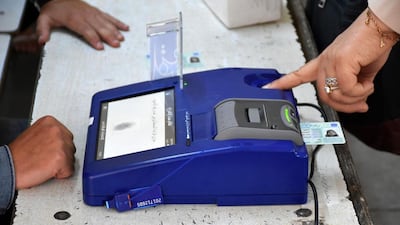A political bloc led by populist cleric Moqtada Al Sadr, a long-time adversary of the United States who also opposes Iranian influence in Iraq, has won the country’s parliamentary election, the electoral commission said on Saturday.
Mr Al Sadr himself cannot become prime minister as he did not run in the election, though his bloc’s victory puts him in a position to have a strong say in negotiations. His Sairoon electoral list captured 54 parliamentary seats.
The Al Fatih bloc led by Hadi Al Amiri, who has close ties with Iran and heads an umbrella group of paramilitaries that played a key role in defeating Islamic State, came in second with 47 seats.
The Victory Alliance, headed by incumbent Prime Minister Haider Al Abadi, took third place with 42.
_______________
Read more:
US and Iran wade in as talks begin on new Iraq government
Iraq's PM congratulates Moqtada Al Sadr on election performance
_______________
The victory was a surprising change of fortunes. The cleric, who made his name leading two violent uprisings against US occupation troops, was sidelined for years by Iranian-backed rivals.
His bloc’s performance represented a rebuke to a political elite that some voters blame for widespread corruption and dysfunctional governance.
Mr Al Sadr’s unlikely alliance with communists and secular Iraqis says it fiercely opposes any foreign interference in Iraq, which is strongly backed by both Tehran and Washington.
It has promised to help the poor and build schools and hospitals in Iraq, which was battered in the war to defeat Islamic state and has suffered from low oil prices.
Before the election, Iran publicly stated it would not allow Mr Al Sadr’s bloc to govern.
In a tweet shortly after results were announced, Mr Al Sadr said: “Reform is victorious and corruption is diminishing.”

Winning the largest number of seats does not automatically guarantee that Mr Al Sadr will be able to hand-pick a prime minister. The other winning blocs would have to agree on the nomination.
In a 2010 election, Vice President Ayad Allawi’s group won the largest number of seats, albeit with a narrow margin, but he was blocked from becoming premier, which he blamed on Tehran.
The election dealt a blow to Mr Abadi, but he could still emerge as a compromise candidate palatable to all sides because he has skillfully managed the competing interests of the United States and Iran - unwitting allies in the war against Islamic State - during his term in office.
Mr Amiri is regarded as one of the most powerful figures in Iraq. He spent two decades fighting Saddam Hussein from Iran.
Iranian Major General Qassem Soleimani, commander of foreign operations for Iran’s elite Revolutionary Guards and a highly influential figure in Iraq, has been holding talks with politicians in Baghdad to promote the formation of a new cabinet which would have Iran’s approval.
Negotiations are expected to drag on for months.
The government should be formed within 90 days of the official results.

